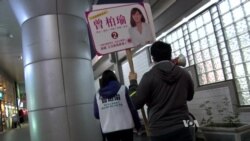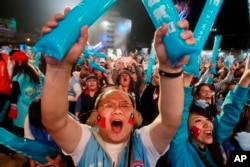Taiwan elects a new president and legislature on Saturday and young voters as well as candidates are expected to play a pivotal role in what could be a historic race. Analysts say that with their support the opposition Democratic Progressive Party could win control of both the legislature and presidential office for the first time ever.
More than 18 million are eligible to vote, and nearly 40 percent of them are under age 40.
An explosion of interest in politics in Taiwan in recent years brought on in part by what some feel is the island’s over-reliance on the Chinese economy is expected to not only bring more voters to the ballot box, but has led to a growing number of young candidates.
Youngest candidate
Tseng Po-yu is a recent graduate and was a spokesperson during Taiwan’s Sunflower Movement, a popular uprising that led to the occupation of the country’s legislature in March of 2014 and brought hundreds of thousands out into the streets to protest a trade pact with China.
She is now campaigning for the Green Party-Social Democratic Party Alliance, and like many other newcomers is running against a well-established incumbent. But that is not stopping her.
On a rainy Tuesday night, just four days before the elections, she stood on a small stool, and in a now raspy voice from campaigning called for an end to politics dominated by two key parties -- the ruling Kuomintang Nationalist Party (KMT) and the opposition Democratic Progressive Party or DPP.
“We believe that younger candidates have their strengths just as they have their weaknesses, and we are working to convince voters that a 24-year-old can help give them a better life,” she said.
Age and experience are not the only challenges she and other young candidates are facing. Money is also a big obstacle.
“I knew that elections cost money, but never imagined it would be so expensive,” Tseng said, adding that her opponents spend as much or more than her entire campaign budget each month.
Third force
Tseng is part of a loose grouping of younger new parties called the Third Force. Her party is not cooperating with established political brands such as presidential election frontrunner Tsai Ying-wen and the Democratic Progressive Party or DPP.
But other candidates, such as Freddy Lim and his New Power Party, are cooperating with the DPP. The New Power Party’s performance in the elections and polls has been so good that some analysts believe the new political group could play a key role in helping the DPP win control of the legislature for the first time in the island’s history.
Lim is the lead singer of metal band Chthonic whose stance on Taiwan’s independent identity from China has long been clear. It is also one of the party’s key positions.
“We advocate the normalization of Taiwan’s status. In reality, Taiwan is a country, it is just that the international community does not recognize that and because of domestic political and legal reasons such as the constitution that we are constantly in a confusing and awkward state,” Lim said.
No longer silent
Young voters used to be less active in Taiwan’s elections. Analysts say KMT President Ma Ying-jeou’s failure to bring economic benefits to the island by building closer ties with China and changes to school textbooks prior to his term in office that focused more on native identity have contributed to a surge in activism among young voters.
Young voters "are ideologically alienated from the KMT’s position regarding China and are economically vulnerable to the situation that the KMT helped bring about," said Wu Yu-shan, director of the Institute of Political Science at Taiwan's Academia Sinica.
That has led to a surge in support for the DPP and smaller new parties.
Outside National Taiwan University students were largely hopeful the elections would bring about change that would not only impact relations with China, but also help Taiwan build on its economic strengths and be allowed to join regional economic free trade agreements.
“We rely too much on the Chinese market and perhaps at the same time we have overlooked other markets and should now shift our focus elsewhere away from the mainland,” one student said, adding that the island needs to upgrade its industrial capacities as well.
Kuo Yu-hsiang, a major in agriculture, said that Taiwan should try to do more to develop and internationalize the strengths of its own local culture and products.
He said that while Chinese culture has had a big impact on Taiwan, the island needs to focus on what this land has to offer.
“I would hope that the candidates that get elected will focus more on Taiwan’s native culture and economy and use that as a focal point to go out to the rest of the world,” Kuo said.
Although some say they are hoping the Third Force will help create a new political environment for Taiwan, others were worried that some of the activists turned candidates were jumping into politics too quickly.
“If some of the candidates are elected that won’t necessarily be a bad thing, but there will also be a lot restraints that will make it difficult for them to carry out their goals,” said Wu Chun-chi, a sociology major at National Taiwan University.











